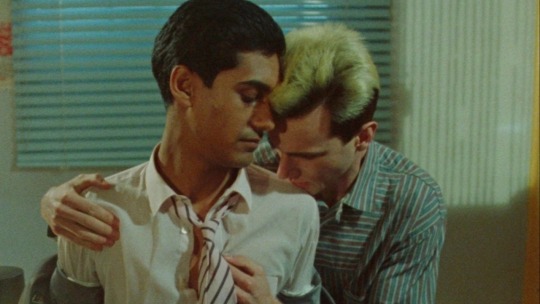#that daniel and johnny are VERY gay around each other specifically in a way that is so cringy and dorky -- I love that for them
Text
you know the bit in cobra kai where the brohams are making fun of johnny's headband and he dejectedly takes it off
and then when he's training with daniel and taking him to do eagle fang, he opens the door wearing the headband
idk somethingsomething recognition and finding a person who not only doesn't judge you but Knows you (the things about yourself you love and secretly wish others would love) and the total lack of fear and all that other gay shit
#cobra kai#ck#johnny lawrence#daniel larusso#lawrusso#to be clear: it's also really really funny to me#that daniel and johnny are VERY gay around each other specifically in a way that is so cringy and dorky -- I love that for them#enough of gays you can take seriously -- we need more gay losers (affectionate)#like we're talking about a fucking HEADBAND here but it means so much to johnny and daniel knows that#and hey -- he ALSO has a meaningful headband! wouldya look at that#if they weren't old men id wanna shove them in a locker -- to bully them but also so they could sort shit out and make out#since they ARE old men i mean... idk... they're already doing a prolonged mating dance i guess just get out of the way?#and hope they don't trip up too many times as they're doing the dance?#stupid stupid show stupid stupid men i love it all very very much
134 notes
·
View notes
Photo

Under the Stars.
On the UK release of Harry Macqueen’s tender Supernova, the writer-director talks to Ella Kemp about timeless love stories, his favorite screen lovers and working with best buds Colin Firth and Stanley Tucci.
Love is patient and love is kind in Supernova, Harry Macqueen’s tender story of marriage, memory and maps. It’s an autumnal study of a mature, rock-solid love and the unfair illness that threatens to undo it. We’ve seen stories about gay lovers that end in tragedy before, but this one is different: a sense of security and trust infuses the final holiday of husbands Sam and Tusker, as they come to terms with Tusker’s recent diagnosis of early-onset dementia.
Colin Firth and Stanley Tucci play the couple—a pairing written in the stars, since the actors have been best friends for twenty years—who are traveling England in an RV, visiting places and people they have loved. Sam is a pianist, Tusker a star-gazing novelist. Together, they mine emotions that manifest in everyday care rather than grand, theatrical gestures. Julien describes Supernova as “a marvel of tiny moments that feel so real they register like bullet wounds,” while Lola feels the destabilizing power of these lovers. “I love love,” she writes, “but love is painful, beautiful, heart wrenching, frightening and forever.”
Supernova is the second feature from Macqueen as a writer and director after 2015’s Hinterland, in which he starred opposite Lori Campbell in a contemporary, rural tale of a companionship that spans decades. A London-trained actor, he made his debut in the under-seen Richard Linklater film, Me and Orson Welles. On Supernova, however, Macqueen remains firmly behind the camera.
The filmmaker opened up about the stars in the sky, the ones on our screens, intimacy, pride and more for his Life in Film questionnaire.

Harry Macqueen on location with Colin Firth for ‘Supernova’.
What do you think the connection is between stars—the celestial kind—and lovers?
Harry Macqueen: Historically, we’ve always found the cosmos to be both perplexing and inspiring. I suppose there’s a kind of infinite beauty in space that is definitely related to love, and especially for a character like Tusker, who is contemplating his mortality. He’s looking up at the stars and thinking about what they mean, and what he means in that context, and it seemed like something that would be a natural thing to do if you were in that situation.
In terms of the other kind of stars—your incredible actors Colin Firth and Stanley Tucci—how did you find the right people to bring Sam and Tusker’s love to life?
I think that what they do in the film is very surprising, in a way that’s beautiful and delicate. But it was also one of the easiest casting processes of any film, ever. Stanley was the first person we sent the script to and he read it very quickly and responded to it in the way that you hope that people will. We were really interested in one of the characters being not British—we felt there was something potentially quite stuffy about having two Brits bumbling around the countryside, so another culture would add a bit of a different energy to it.
Stanley loved the script and we got on really well. I really wanted, hopefully, to get two actors who knew each other and had a shared history for these intimate roles. And he said, “I don’t know whether you know, but my best mate is Colin, and I could get the script to him.” I obviously said yes and he said, “Okay, well, I already have, and he loves it and he wants to meet you.” So it was all a bit of a dream!
Let’s talk about the inception of the script. Supernova is obviously a story about love, but it’s about illness and death and mortality and all of these things, which feels significant in terms of it being a gay love story. A lot of queer love stories in cinema are tragic, but also are often very specifically reckless and youthful, and don’t really linger on this later chapter in life. How early did you know, then, that this film would be about two men?
If you’re talking about early-onset dementia, you’re naturally talking about people in their fifties or sixties, so I knew that I was always going to tell a story about romantic love of some kind in that part of your life. I had done a lot of research around that, and I realized I had never worked with a same-sex couple. All the couples and families that I’d worked with, the central relationship had been a heterosexual one. So my initial reaction was to write that story, but then I countered that really quickly and wanted to challenge why that was my initial inkling.
I just thought, I’m writing about really universal themes—love and death and life and trust and companionship—and it seems to me that no one sexual orientation or gender has a monopoly on those things.
And you’re right, LGBTQ+ cinema over the years, quite often for very, very important and understandable reasons, has been about that period of flux, transitioning or coming out, the moment of becoming your true self at a certain time of life, when you’re usually quite young. And that is quite fraught, frantic and a bit grimy sometimes. So I was aware that there was a gap in cinema to present a love story about two people of the same sex who were in this stage of life. That romantic, mature love we don’t talk about very often.
The film also aspires to be the type of story in this type of community that I hope that I live in, even if perhaps I don’t—to tell a story in which the sexuality of the characters isn’t mentioned. It’s just accepted, embraced and loved. The sexuality of the characters doesn’t impact the story or inform anything, it’s just their lived experience in the world. I’m really proud that we did that, because I genuinely think, in its own tiny way, it’s a revelation.

Colin Firth and Stanley Tucci navigate love and illness in the Lake District.
This film, materially and aesthetically, is beautiful. The landscapes, the actors, Sam and Tusker’s knitwear. How did you navigate the balance between creating this very cozy world that also understands heartbreak and decay as potent things?
What I want to try and do in films generally is wrap an audience up in an intimate world between two people, and hopefully allow the audience to fall in love with those people. That shared history they have meant that all of these things felt quite organic. They’ve got some money, but they’re in a camper van, they’re not loaded. They’re reasonably creatively successful, but they’re not famous, necessarily. They’re just two guys trying to live under quite extreme conditions.
The intimacy in the film is really, really important to me. What degree of romantic intimacy these characters have, how you film that, and how you plonk an audience in there. Because you don’t want to make a dirge—the film is life-affirming because they love each other so much, and because of that, it’s also devastating.
So that informs every choice you make stylistically. It’s quiet, and it’s patient, and it felt like exactly the right way to tell this story, to not intrude on this beautiful relationship, to not impose anything on it, to be very simple, really—which, as I’m sure you know, it’s not simple!
I know that kind of filmmaking is not to everyone’s taste, that avoidance of melodrama, that lightness of touch. I find it beautiful, but others probably don’t.

Gordon Warnecke and Daniel Day-Lewis in ‘My Beautiful Laundrette’ (1985).
Now, a few Life in Film questions. Who are your favorite gay lovers on-screen?
Carol and Therese in Carol, Russell and Glen in Weekend, Marianne and Héloïse in Portrait of a Lady on Fire, Johnny and Omar in My Beautiful Laundrette.
What is your favorite timeless love story?
This is so difficult! Maybe Alice in the Cities, Wendy and Lucy or the Before... trilogy.
What is the best film about pride, the definition of which is very much open to interpretation?
Jiro Dreams of Sushi—a brilliant film about having pride in your craft.
What should we watch after Supernova?
I tend to be a bit controversial and say the couple from Amour by Michael Haneke. Or maybe Life of Brian, or a Studio Ghibli film—but definitely not Grave of the Fireflies.
What was the film that made you want to be a filmmaker?
I’m not certain there is a specific one, but there are films you encounter all the time that make you want to be a filmmaker all over again. The two films that made me think it might actually be possible were Old Joy and Katalin Varga—they inspired me before I had any budget or experience. But it could also be any Yasujirō Ozu film, or Taste of Cherry by Abbas Kiarostami. All very inspiring in their own way.
Related content
Queer Love and Desire: a list by the Criterion Channel
The Pride of Sundance: 400 LGBTQ+ films to watch this June, curated by the Sundance Film Festival
101 Must-See Movies for Lesbians: Jenni Olson’s list (including Carol)
Follow Ella on Letterboxd
‘Supernova’ is in UK theaters now, and available to stream on Hulu, or rent/buy from other VOD services in the US.
#harry macqueen#supernova#queer love#queer film#queer cinema#pride#pride 2021#gay film#colin firth#stanley tucci#early-onset dementia#road movie#letterboxd
1 note
·
View note